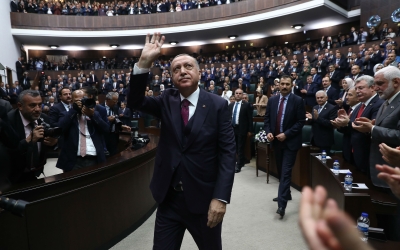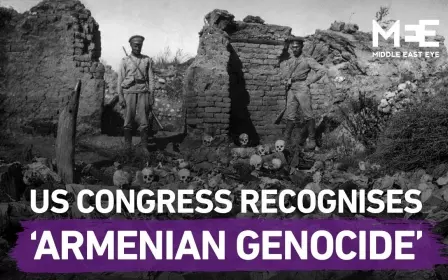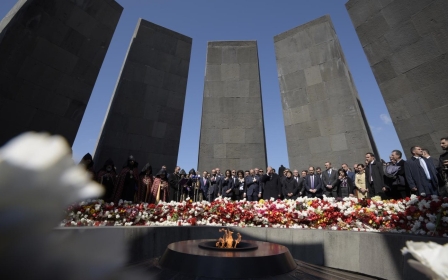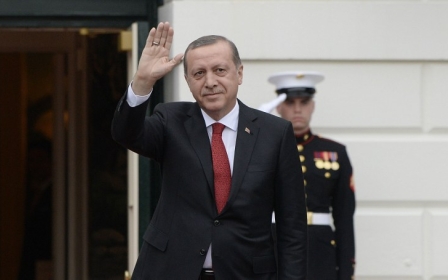'The wind blew the right way': Armenian Americans welcome 'genocide' resolution
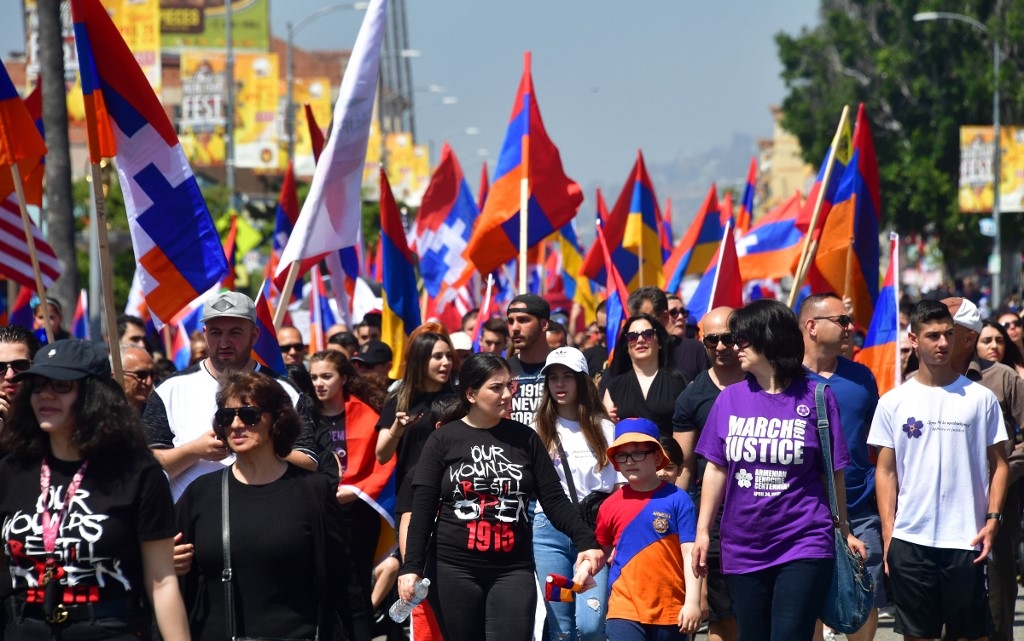
On 29 October, the US House of Representatives resolved to describe the mass killing of Armenians in the Ottoman Empire between 1915 and 1923 as a genocide.
House Resolution 296, voted in with almost no opposition at 405-11, ruled that the House would “reject efforts to associate the US government with efforts to deny the existence of the Armenian Genocide or any genocide”.
While non-binding and mostly symbolic - for the resolution to become US government policy it would still need to be taken to the Senate - the passing of the resolution brought a heightened sense of relief for many Armenian-Americans who have campaigned for decades to raise interest in their cause.
“I believe the passage of this resolution and the admittance of genocide is an important victory for this community, a community that was largely formed by those who were able to escape the genocide,” said Syuzanna Petrosyan, associate director at the Institute of Armenian Studies at the University of Southern California.
Sophia Armen, an Armenian-American social justice organiser from Los Angeles, agrees.
New MEE newsletter: Jerusalem Dispatch
Sign up to get the latest insights and analysis on Israel-Palestine, alongside Turkey Unpacked and other MEE newsletters
Armen told Middle East Eye that she welcomed the resolution “not because the US has any moral authority, but because it means finally our decades-long day-in and day-out activism has come to fruition.”
Decades of lobbying
Historians say an estimated 1.5 million Armenians were killed in Ottoman-controlled territory through systematic deportations, starvation and murder between 1915 and 1923. During that period, Turkish forces were fighting in the First World War and then against the occupation and partition of Anatolia by allied forces in what Turks call the Turkish War of Independence.
Though it acknowledges that many Armenians died during the conflicts, the Turkish government denies that mass systematic murder was carried out.
For decades, the Armenian American community, now numbering around two million, have struggled to convince Congress or the US government to recognise the massacre as genocide.
“The refusal of the federal government to accept the correct terminology to describe this terrible moment in Armenian history has meant that very little pressure - if any - has been put on Turkey by the US to open conversations about the Armenian genocide,” said Rachel Goshgarian, an associate professor at Lafayette College in Pennsylvania.
“[This has] seemingly encouraged silence surrounding these histories to permeate Turkish society, and perpetuating even more cultural destruction in the country,” she told MEE.
About 30 countries around the world recognise the Armenian genocide, while every state in the US, besides Mississippi, recognises it, too.
For Mihran Toumajan, a director at the Armenian Assembly of America, an organisation that describes itself as the largest, non-partisan Armenian-American advocacy organisation in the US, the “decisive acknowledgement of the Armenian genocide is a serious crack in the wall of the government of Turkey’s state-sponsored and richly-funded policy of denialism and whitewashing of the Armenian genocide.”
And even if Armenian Americans are grateful for the efforts behind getting this resolution passed, they are under no illusions as to the reasons for why it happened so smoothly.
“Some people are very happy with this vote and keep repeating to me 'a win is a win', but others in the Armenian communities of the US are concerned (as am I) that celebrating this vote - which doesn't guarantee much - when it seems to represent more of a political statement to Turkey rather than a genuine desire to recognise human rights will eventually lead to more disappointment,” said Goshgarian.
Punitive measure
The passing of the House resolution has taken place against the backdrop of Turkey's military operation against Kurdish forces in northern Syria who were previously backed by the United States in the fight against the Islamic State group, and a souring of relations between Washington and Ankara.
The Turkish government says the operation is necessary to secure its border from forces that it considers to be an extension of the militant Kurdistan Workers' Party (PKK), which is listed as a terrorist organisation by both Turkey and the US.
But mooted Turkish plans to settle Syrian refugees in the area have raised the spectre of ethnic cleansing and fuelled further outrage against US President Donald Trump, whose withdrawal of US forces from northern Syria was seen as tacit approval for Turkey's actions, setting the scene for the introduction of punitive measures against Ankara.
“Given that the Turks are once again involved in ethnic cleansing the population - this time the Kurds who live along the Turkish-Syrian border - it seemed all the more appropriate to bring up a resolution about the Ottoman efforts to annihilate an entire people in the Armenian genocide,” Congressman Adam Schiff, who introduced the House Resolution 296, said ahead of the vote.
Following the successful passing of the resolution, lawmakers reiterated their call for sanctions on Turkey.
Meanwhile, Ankara denounced the resolution, repeating its argument that the claim of genocide was "devoid of any historical or legal basis" and called the move "a meaningless political step".
'This vote uplifts the community's spirit and determination to double up our efforts to continue to pursue our course in terms of worldwide recognition, retribution and reparation'
- Taleen Babayan
A convergence of political interests and political expediency the result might have been, but Taleen Babayan, a journalist and playwright based in NYC, says the community will take it, warts and all.
"This vote uplifts the community's spirit and determination to double up our efforts to continue to pursue our course in terms of worldwide recognition, retribution and reparation," she told MEE.
The US has traditionally stuttered on formulating a position on the genocide.
Though the House acknowledged the genocide in 1975 and 1984, it has, as a matter of policy, steered clear of using the word "genocide".
Behind the scenes, the State Department and successive US presidents have been routinely seen as using the genocide as a bargaining chip.
Ahead of the vote, Khatchig Mouradian, a lecturer in Middle Eastern, South Asian and African Studies at Columbia University, wrote in the Washington Post that the US government “has exploited and weaponised Armenian genocide resolutions to extract concessions from Ankara on other fronts - and continues to do so today.”
Geopolitical pawn
Audrey Selian Matian, co-founder of Impact Hub Yerevan, a business incubator, described the community as “happy, but cautious”.
“Who wouldn’t be happy to see a just outcome when it acknowledges a long-denied fact of history, after all?” she asked rhetorically.
Yet she can't shake off the feeling of being used as a pawn in a larger geopolitical contest between giants.
“The wind blew the right way for our acknowledgement this time. But it might well blow the wrong way for someone else next time because the action has not been based on principle,” Matian told MEE.
Likewise, Goshgarian, from Lafayette College, said despite its importance, she wouldn’t go so far as to describe the resolution as brave.
She says that for most Armenians the key to healing remains not so much in the halls of Congress or the US Senate, but in Turkey itself.
“For me, probably the most important result of the vote was the speech that Garo Paylan [a Turkish MP of Armenian descent] gave in the Turkish Parliament the following day,” said Goshgarian.
“In his speech, he said that the Armenian genocide must be discussed in Turkish parliament and that only once it is discussed in Turkey will Armenians begin to be able to heal. I couldn't agree with him more.”
Middle East Eye delivers independent and unrivalled coverage and analysis of the Middle East, North Africa and beyond. To learn more about republishing this content and the associated fees, please fill out this form. More about MEE can be found here.


